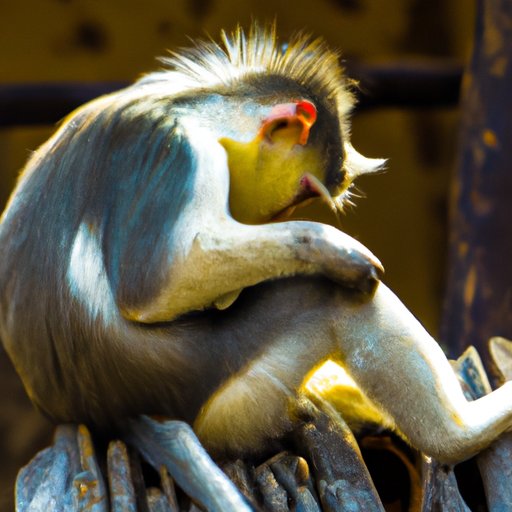Introduction
Having a monkey as a pet can be incredibly rewarding, but it also comes with a great deal of responsibility. Monkeys require specialized care and attention, so it’s important to be prepared before bringing one home. This article provides an overview of how to properly care for a monkey at home, from creating a safe and secure habitat to providing a steady supply of fresh fruits and vegetables, establishing a routine for feeding, bathing, and exercise, monitoring your monkey’s health, and giving your monkey plenty of attention and interaction.
Creating a Safe and Secure Habitat for Your Monkey
The first and most important step in caring for a monkey is creating a safe and secure habitat. The size and type of enclosure you choose will depend on the type of monkey you have, as well as the amount of space you have available. Monkeys need space to move around and explore, so be sure to choose an enclosure that is large enough for your monkey to comfortably move around in. For example, a single marmoset should have an enclosure that is at least 8 ft. x 10 ft. x 8 ft., while a larger monkey such as a capuchin should have an enclosure that is at least 10 ft. x 10 ft. x 8 ft.
In addition to the size of the enclosure, it’s important to make sure it is constructed of safe materials that won’t harm your monkey if ingested. You also want to make sure the enclosure has a secure latch or lock to ensure your monkey can’t escape. Finally, be sure to include plenty of toys and items for your monkey to play with, such as swings, ladders, ropes, and branches.

Providing a Steady Supply of Fresh Fruits and Vegetables
In order to keep your monkey healthy and happy, it’s important to provide a steady supply of fresh fruits and vegetables. Monkeys are omnivores, so their diet should consist of a variety of fruits, vegetables, nuts, and insects. Some of the best fruits and vegetables to feed your monkey include apples, bananas, strawberries, blueberries, carrots, sweet potatoes, spinach, kale, and broccoli. Be sure to avoid feeding your monkey anything sugary or fatty, as this can lead to obesity and other health problems.
It’s also important to ensure your monkey is getting all the necessary vitamins and minerals. A good way to do this is by supplementing their diet with a daily multivitamin. Additionally, you should always consult your veterinarian to make sure your monkey is receiving the proper nutrition.
Establishing a Routine for Feeding, Bathing and Exercise
In addition to providing a steady supply of fresh fruits and vegetables, it’s important to establish a regular routine for feeding, bathing, and exercise. Setting specific mealtimes and sticking to them is key to ensuring your monkey gets the nutrition they need. Additionally, you should incorporate bathing and exercise into your routine. Allowing your monkey to take regular baths and engaging them in physical activities such as climbing and swinging will help keep them healthy and happy.
Monitoring Your Monkey’s Health
It’s important to monitor your monkey’s health on a regular basis. Look for signs of ill health, such as lethargy, loss of appetite, diarrhea, and vomiting. If you notice any of these signs, be sure to contact your veterinarian right away. Additionally, it’s a good idea to weigh your monkey weekly and record the results. This will help you catch any sudden weight changes that could indicate a health issue.

Keeping an Eye Out for Stress or Behavioral Issues
Monkeys are highly intelligent and social animals, and they can become stressed or exhibit behavioral issues if they are not provided with adequate mental stimulation. Common signs of stress or behavioral issues include excessive grooming, pacing, and self-mutilation. If you notice any of these signs, it’s important to address the issue right away. One way to do this is by providing your monkey with plenty of enrichment activities, such as puzzles, foraging games, and interactive toys. Additionally, spending time playing with and interacting with your monkey can help reduce stress and prevent behavioral issues.

Giving Your Monkey Plenty of Attention and Interaction
Finally, it’s important to give your monkey plenty of attention and interaction. Spending quality time with your monkey every day is essential for their emotional wellbeing. Some activities you can do with your monkey include playing fetch, teaching them tricks, and exploring new environments. Additionally, providing plenty of affection and positive reinforcement will help strengthen the bond between you and your monkey.
Conclusion
Caring for a monkey at home requires dedication and commitment. It’s important to create a safe and secure habitat, provide a steady supply of fresh fruits and vegetables, establish a routine for feeding, bathing, and exercise, monitor your monkey’s health, keep an eye out for stress or behavioral issues, and give your monkey plenty of attention and interaction. By following these tips, you can ensure your monkey stays happy and healthy for many years to come.
(Note: Is this article not meeting your expectations? Do you have knowledge or insights to share? Unlock new opportunities and expand your reach by joining our authors team. Click Registration to join us and share your expertise with our readers.)
